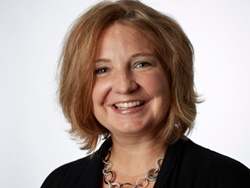
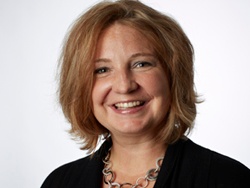
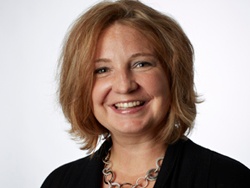
Effective and creative ways to implement energy, enthusiasm and interaction into training were zinging past participants at the annual Bob Pike Group Conference - and many of those ideas were from the participants themselves and not just the conference faculty.
The 2012 Annual Training and Learning Conference kicked off Wednesday, September 12, 2012 with Becky Pluth keynoting, about asking better questions to get better information upon which to act, was entitled "Digging and Deciding," in keeping with our Indiana Bob and the Kingdom of Crystal Clear Learning 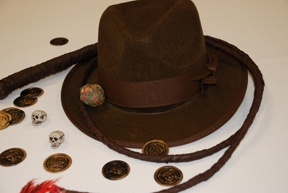 theme.
theme.
"How questions are asked and answered has broader implications than mastering content. It develops critical thinking skills," said Pluth. "Teach Talk, a newsletter for educators dedicated to promoting best practices in the classroom, suggests that successful questioners utilize several skills when crafting and asking good questions. These include phrasing and sequencing questions effectively, responding to questions so that class time is used efficiently, keeping questions from leading to digression (unless the digression is useful), and using the right tone and delivery both when asking and responding to question."
Pluth also focused on how questions can help us be more accountable in finding our own answers and taking personal responsibility. The book QBQ (The Question Behind the Question) "has been developed to help individuals practice personal accountability by asking better questions," Pluth said. "This is built around the idea that our first reaction is often negative. But in each moment of a decision, we can discipline our thoughts to look behind the initial question and ask a better one, the question that will lead us to better results."
After Pluth's session closed with a game of Catapult, where the women defeated the men, participants then could choose from a variety of concurrent sessions. Those in Priscilla Shumway's class learned effective ways of working with difficult participants so training wasn't hampered for other classmates.
Each table in Shumway's class was assigned a "difficult participant" like Chatty Kathy or Texting Tom and told to share methods they've used to stop the difficult behavior. Participants came up with 23 different ways to use body language, placement or activities. Shumway then followed up with seven additional ideas on how to corral the culprits, including the Lion, or the confrontational conferee. "Any time you have to talk to someone privately for challenging behavior, ask to speak to them at break [separately]," Shumway said. "Have this person come to you. Don't go to them-have them come to your 'seat of power;' state the behavior, then state how it's affecting the others' ability to learn and how it is impacting you as instructor. Then ask for his commitment to stop that behavior. Get his commitment. If the behavior continues, talk to him again, then escalate [by speaking] to the manager or supervisor."
Kevin Herrholtz, conference guest faculty from Turning Technologies, analyzed and modeled how good questions are phrased for both paper tests and online group tests that can be completed with audience response "clickers" during a later concurrent session. The basic "procedural rules" include avoiding multiple correct answers. "You want [the question] quick, right to the point," Herrholtz said. "If you have a question with multiple correct answers, separate into multiple questions."
He also said to avoid trick questions and use the active voice. The ideal question will be answered by 60-65 percent of the testing population if the question is valid, he said. If the correct response is higher, then the question is too easy. Response lower? The question is too difficult. And, for ease of use, "use letters in front of number choices."
Bob Pike keynoted during day two of the conference as he shared specific examples of how Indiana Bob came to be, which included an activity from Mr. 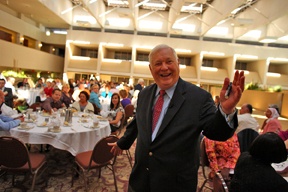 Wizard. Bob had all participants fill their mouths with air. "Now, push that air out of one cheek and into the other," Bob said. "The amount of gas hasn't decreased, but the amount of space it has to occupy has. Do you feel more pressure on the full cheek?" Bob asked as participants nodded in the affirmative.
Wizard. Bob had all participants fill their mouths with air. "Now, push that air out of one cheek and into the other," Bob said. "The amount of gas hasn't decreased, but the amount of space it has to occupy has. Do you feel more pressure on the full cheek?" Bob asked as participants nodded in the affirmative.
Bob said this example of interactive learning, demonstrated by Mr. Wizard who encouraged viewers to follow the same instructions Bob had given his listeners, had made it easy for a young boy to grasp Boyle's Law which states the pressure and volume of a confined gas are inversely proportionate. If the pressure goes up, the volume has gone down.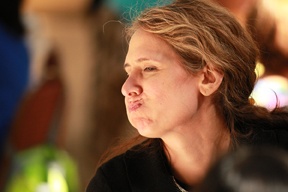
After Bob's keynote, Scott Enebo offered an entertaining and useful session on ways to speak on your feet while minimizing fears and improving your impact. Enebo opened with an impromptu speech given by every participant (see Enebo's opener here) then shared ways to create and organize presentation flow.
Enebo encouraged the attendees to prepare an opener and closer for their presentation, if it was appropriate. "These important elements serve as the bookends to your presentation and often determine whether or not a presentation grabs the audience's attention and ends with impact," Enebo had written in the session takeaway.
Methods for planning the presentation included mindmapping or clustering, using 3x5 cards or sticky notes to list all main points and subpoints so they could be easily rearranged, and list building around a category. When giving the presentation, Enebo covered a few key tips, including, "Breathe." He also encouraged the trainers to "tell the truth" and use their own experiences, especially if they're filling in for someone else's presentation. And if you don't know something, be willing to admit it and either throw it back to the room to answer or let them know you'll follow up and get the answer for them.
Other tips were provided by participants including, "Script out your opening when you're most nervous."
The Bob Pike Group Annual Training and Learning Conference is open to all individuals, whether you have participated in one of our workshops or not. The next conference is in Minneapolis, September 11-13, 2013. Make plans to join us!
Don't miss out on updates and chances
to sharpen your skills with participant-centered learning.




3740 N Chestnut St #113 - Chaska, MN 55318-3053